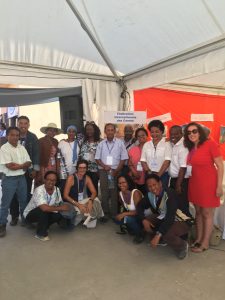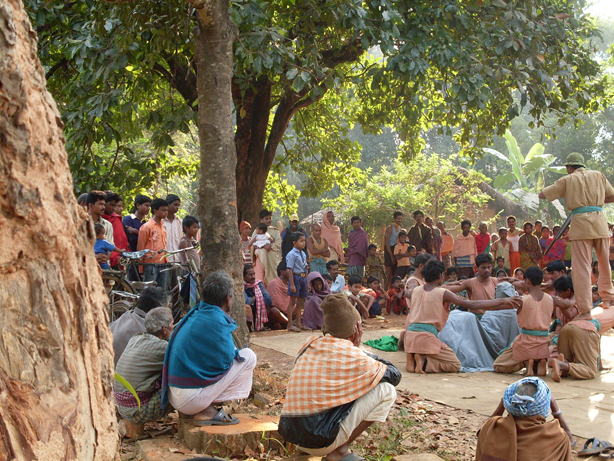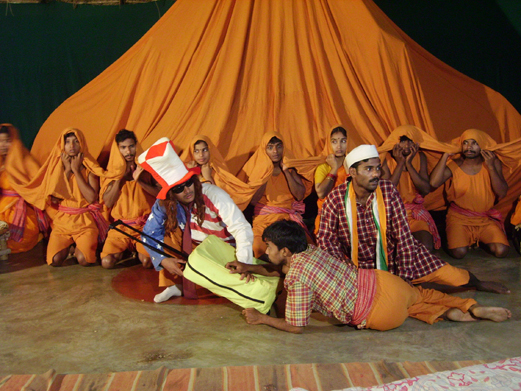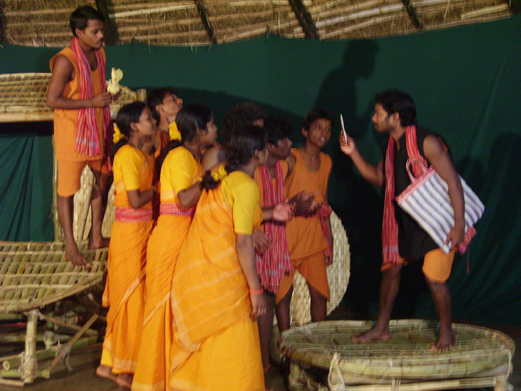By Ficeméa
 26 and 27 November 2016 will be remembered as a major victory for supporters of high-quality public education. At the summit in Madagascar, the 57 Member States of the International Organisation of La Francophonie adopted the Antananarivo Declaration which explicitly refers to the the problems associated with the commodification of education. This is the strongest statement ever made by heads of State against commodification and in support of public education and regulation. It is a sign that efforts by civil society actors to raise awareness on the matter amongst State representatives and international bodies have been successful. It also shows how important all of our joint efforts in recent months have been.
26 and 27 November 2016 will be remembered as a major victory for supporters of high-quality public education. At the summit in Madagascar, the 57 Member States of the International Organisation of La Francophonie adopted the Antananarivo Declaration which explicitly refers to the the problems associated with the commodification of education. This is the strongest statement ever made by heads of State against commodification and in support of public education and regulation. It is a sign that efforts by civil society actors to raise awareness on the matter amongst State representatives and international bodies have been successful. It also shows how important all of our joint efforts in recent months have been.
The declaration included the following paragraph “Recognising the development of commercial schools and educational institutes and supporting high-quality public education provided free of charge to everyone, we call upon the IOF and the Conference of Ministers for Education in the States and governments of the Francophonie (Confémen), in cooperation with civil society, to continue the discussions started at the Kinshasa Summit (2012) and to take measures to promote effective institutional mechanisms for regulating private actors in the education sector in order to guarantee the quality and fairness of education services.”
Whilst the fact that so many Heads of State expressed such a clear position on the issue is an important step in itself, it is now essential that national authorities are held accountable for the implementation of this declaration.
Commodification of education – a multifaceted process
In recent years, the international community has witnessed unprecedented growth in the role of private actors in the education sector, with the result that education systems have been totally transformed in both the “South” and in the “North”. This also includes actors offering low-cost, poor quality services which target emerging and poor countries. Many investors, and multinational companies in particular, are involved on a large scale in the highly lucrative education “market”. The commodification of education is an insidious process that takes various forms and impacts both the formal and non-formal education sectors. It results in business ventures offering academic support, study coaches, ready-made “kits” for coping with dyslexia or dysorthographia, “educational” digital software etc.
This multifaceted phenomenon impacts the quality of educational content and knowledge acquisition. It leads to segregation between different areas of countries and different socio-economic groups, further widening social inequalities. As a result, it puts the right to education itself at risk.
The commodification of education is defined as the transformation of education into a profitable commodity. There are two types of commodification. First, the privatization of education, which is defined as increased control of the education sector by private actors. Secondly, it entails privatization of the educational methods used, i.e. the introduction of methods and approaches used in the private sector into the public education system.
Three major consequences can be identified:
- Basic education becomes inaccessible and social inequalities are widened. A recent study[1] by Solidarité Laïque and the Global Initiative for Economic Social and Cultural Rights, in partnership with associations in Haiti, including the Ceméa Haiti, analyses the situation in a country where 84% of schools are private schools: “Policies on access to education have not been the much hoped-for catalyst for equal opportunities, but rather have helped further widen the inequalities that already existed.” One of the reasons for these inequalities is the cost of enrolment, which mainly affects the poorest households as it constantly increases. According to 62% of households, these excessively high costs and other financial barriers are the main reason that children aged between 3 and 16 years are not sent to school. More than 90% of Haitian households also said that they either did not have or barely had sufficient resources to cover their basic needs, which means that children’s education is in jeopardy. »
- Standardization of teaching methods. For example, the number of ‘Low Cost Schools’ is growing. Bridge International Academies Ltd (BIA) is a US-based profit-making company. It is the largest private business school chain in the world. Bridge International Academy schools are funded by Pearson, the Bill Gates Foundation and Facebook. These ‘low cost schools’ have been set up in Liberia (20 schools), Kenya (400 schools) and Uganda (63 schools). The concept is based on two keywords: rationalization by economies of scale and standardization. The Bridge Academy has designed teaching tools linked to lessons read out by the “teacher” from a tablet. The teacher becomes a simple ‘coach’ who is given a class after five weeks of training. The same content is taught in the same way in all schools at the same time. The Ugandan government has taken legal action to close Bridge schools because they did not meet minimum teaching standards. However, the company still hopes to reach 10 million students by 2025.
- Replacement of public funding (national and international) by partnerships granted to private companies which are more focussed on profit targets than educating the population. Let’s take the partnership between the Ministry of Education in France and Microsoft as an example. Since the financial stakes are high, the big digital companies – GAFAM (Google, Amazon, Facebook, Apple, Microsoft) in particular – try everything they can to impose their standards and their products, not only in terms of the equipment schools use but also, and above all, through teaching practices.
Combatting this commodification is a major challenge for all involved in defending the right to education for all, throughout life.
The statement by the IOF against commodification – a joint response at international level and a tool for advocacy
It is in this worrying context that a group of non-governmental organizations, trade unions, researchers and educational movements, including the Fédération Internationale des Ceméa, have created an international consortium to reflect on and take action on this issue. These actors are coordinating research and advocacy activities and also working on a methodology to identify the impact of privatization on human rights.
The Francophone members of this consortium have written a joint appeal from civil society that speaks out against the commodification of education and education systems. The text aims to alert public authorities and civil society actors to the issue and to raise their awareness of the inherent dangers connected with this process of commodification of education. It also urges them to take action to counter this process.
Today, our Appeal Against the Commodification of Education was signed by 302 civil society organizations from 38 countries.
This appeal now needs to be passed on, heard and debated. States, regional institutions such as the European Union and the African Union must, like the UN[2] and the IOF, protect and boost education as a genuine public good, and promote a vision of education as a driving force for individual, collective and social empowerment.
At national level, we have to call upon the various ministries in every country to take action, mobilize actors involved in educational matters and make proposals because the solutions exist.
We are able to link the local and international levels that are at play in our democracies. International policy guidelines should not be controlled by experts and technocrats alone. They are part of the public debate and must not be disconnected from everyday realities. Our role as actors on the ground and educators is to work with people on these fundamental issues. We must enable citizens to take ownership of national, regional and international policies in order to participate in the debate, understand the issue and be able to act on the policies that shape the future of our societies.
Education is not a commodity it is a right! We want every individual to be able to exercise it.
Sonia Chebbi,
Permanent Delegate at the International Federation of Centers for Training in Active Education Methods (Ficeméa)
___________________________________________________________
The mission of the International Organization of La Francophonie (IOF) is to embody the active solidarity between its 84 member states and governments (58 members and 26 observers). It is a community that shares the same destiny and is conscious of the links and potential that come from sharing a language, French, and universal values.
The IOF aims to improve the living standards of its populations by helping them to become actors in their own development. It provides member states with support to develop or consolidate policies and implements international policy and multilateral cooperation activities, in accordance with the four main missions adopted at the Francophonie Summit:
- • promote the French language and cultural and linguistic diversity;
- · promote peace, democracy, and human rights;
- • support education, training, higher education, and research;
- Develop cooperation activities that support sustainable development
[1] Study [in French] entitled Haïti, enseignement privatisé, droit à l’éducation bafoué [Haiti, privatized education, right to education ignored], an alternative report supported by 10 Haitian and international organizations published on the occasion of the Universal Periodic Review of Haiti in November 2016.
[2][2] In a resolution adopted by the Human Rights Council in July 2016, the United Nations urges States to “address[..] any negative impacts of the commercialization of education”.
 Further when analysing the elements and benefit of theatre : one can discover that –Theatre improves confidence, clarity in vocabulary, sense of logical thinking, power of social-analysis, spirit of teamwork, communication skills etc. The content of a play always sensitizes the political, social, psychological angle of our lives. These are the basic need of a Human Life.
Further when analysing the elements and benefit of theatre : one can discover that –Theatre improves confidence, clarity in vocabulary, sense of logical thinking, power of social-analysis, spirit of teamwork, communication skills etc. The content of a play always sensitizes the political, social, psychological angle of our lives. These are the basic need of a Human Life.




